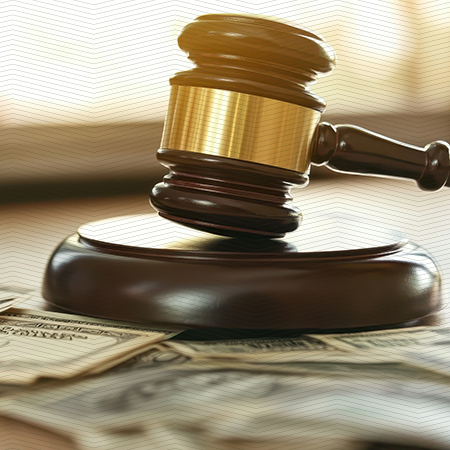
Santa Ana Debt Collector & Creditor Harassment Attorneys
What is Considered Debt Collection Harassment?
In California, once a creditor or collector knows you are represented by a lawyer, they can no longer contact you regarding your debt. They cannot:
- call you,
- email you,
- write you,
- or in any way contact you to collect a debt.
When you choose Fitzgerald & Campbell, APLC to represent you, our Santa Ana debt collection harassment attorneys immediately demand the creditor/collector cease contacting you. This is the quickest and easiest way to stop calls and mail to collect a debt.
Pro Advice: Collection Defense Litigation



Real Client Results
Conquering Your Mountain of Debt Since 1992
-
$1,043,087.06 settled for $492,701.56 Individual
-
Client Saved $27,433.00! UGH, I LLC.
-
$535,175.56 was settled for $375,000.00 Madison 65 Co
-
Client’s debt was reduced by $314,811.00! National Continental Insurance Company
-
$263,963.17 JUDGMENT VACATED! Los Angeles County Superior Court

Pro Advice: New Debt Settlement Law
Debt settlement companies in California became notorious for exploiting their customers, which prompted the recent passage of the Fair Debt Settlement Practices Act. Under this new law, Fitzgerald & Campbell can help protect your rights and sue debt settlement companies that have tried to take advantage of you, just as we have sued many creditors, debt collectors, and banks in the past.
What are the Penalties for Debt Collector Harassment?
Under the law, debt collectors can be held liable for the following penalties if they violate debt collection harassment laws:
- Actual damages sustained. This includes lost wages, pain, humiliation, medical expense, etc.
- Additional damages. Not exceeding $1000.
- Court costs
- Reasonable attorney fees
FAQS: Creditor Harassment & Debt Collection Lawsuits
Question #1: What is the difference between a “Creditor” and “Collector”?
A: Technically speaking a creditor owns the account and a collector is a third party hired to collect it. One company can be both at the same time and many times are. The FDCPA does not apply to original creditors (the original lender), but California law does. Therefore, for purposes of harassment laws in California, there is no real distinction between creditors and collectors.
Question #2: How many times can debt collectors call me?
A: The court has said that it is harassment if a debt collector: calls immediately after hanging up, calls multiple times in a single day, calls your place of employment, family, or friends, calls at odd hours, or continues to call after being requested not to. Generally speaking, for a violation to occur based solely on number of calls, you must have multiple calls in a single day.
Question #3: Can they leave a message on my answer machine?
A: If a debt collector or original creditor leaves a message to collect a debt on an answering machine and the message is heard by third parties or the caller fails to state they are a debt collector or fails to identify themselves properly, you might have a claim. It might be a violation of federal law if the message left is pre-recorded.
Question #4: Should I respond to a collection lawsuit if I owe the money?
A: Definitely! There is no guarantee that the court will properly determine the amount you owe. Also, failing to respond will mean the court will include attorney fees in the judgment. Many times, such fees are improper. If you respond you will also, at a minimum, put yourself in a better position to negotiate a settlement. Sometimes, just responding will cause the collector to dismiss the case and you will owe nothing.
Question #5: What should I do if I wasn’t properly served?
A: Proper service is not something you can decide. You may be right, but unless the court is aware of the bad service, they will assume it was correct. You must respond to the lawsuit even if not served properly. If you don’t, the court will enter a judgment against you.
Question #6: How do I overturn a Default Judgment?
A: The only way to reverse a default judgment is by court order. This can be achieved in two ways:
- The parties agree to set aside the judgment and start again. This means you must get the agreement of the collection lawyer, which can be very difficult to do.
- You must file a motion with the court asking that the default judgment be set aside. To be successful you must show that either you were not served properly or that you qualify under “excusable neglect”.
If you are going to ask that a default judgment be set aside, you must do so without delay
Question #7: What will creditors be able to do if they get a judgment?
A: In California, a judgment creditor can garnish your wages, put a lien on any real estate you own, levy your bank accounts, and seize certain assets. They can also force you to appear in court to answer questions about what you own.
Question #8: Can I be put in jail for not responding to a collection lawsuit?
A: You cannot be put in jail for not contesting a collection lawsuit. You can, however, be put in jail if, after a judgment is entered, you fail to follow court orders requiring you to show up in court and/or fail to answer questions about your assets.
Question #9: I settled my account, but they are stilling calling to collect. What should I do?
A: Call our experienced attorneys immediately. Attempting to collect a debt that is not due is a violation of state and federal laws.
Question #10: Can collectors call my work?
A: They can call you at work until you notify them that you have a lawyer or inform them that you are not allowed to receive such calls. They can never talk to your employer (or any third party for that matter) about their claims until they have court authority.
If you’ve been contacted or harassed by a debt collector, then please contact us so we can talk about your situation. Call (844) 431-3851 or contact us onlinetoday to get started on your free case consultation.
Common Examples of Debt Collection Harassment
The very first line of the Federal Harassment Law (the FDCPA) states,“There is abundant evidence of the use of abusive, deceptive, and unfair debt collection practices by many debt collectors.”
The following are examples of what is considered abusive, deceptive, and unfair debt collection practices:
- Asking you to pay more than you owe
- Asking you to pay interest, fees, or expenses that are not allowed by law
- Calling repeatedly or continuously
- Using obscene, profane, or abusive language
- Calling before 8:00 am or after 9:00 pm
- Calling at times the collector knew or should know are inconvenient
- Use of violence or threatening to use violence if you don’t pay the debt
- Threatening actions they cannot or will not take
- Illegally informing a third party about your alleged debt
- Repeatedly calling a third party to get your location information
- Contacting you at work knowing your employer doesn’t approve
- Failing to send a written debt validation notice
- Ignoring your written request to verify the debt
- Collecting on the debt before providing verification
- Continuing collection attempts after receiving a cease communication notice

Hear From Our Happy Clients
At Fitzgerald & Campbell, your satisfaction is our priority! See for yourself what our clients have to say about working with us.
-
"Great help from the start!"Fitzgerald & Campbell were a great help from the start. Seeking their legal help for dealing with debt collectors was the right decision. The process was simple and straightforward, reducing my stress greatly for a reasonable price. Highly recommend!- C.M.
-
"Clarity and prompt communication."We were involved in a tricky sister-state judgment case from a vehicle accident in Nevada. Several attorneys were stumped, but Fitzgerald & Campbell provided clarity and prompt communication to vacate the judgment. The case is now dismissed without prejudice. Highly recommended.- E.C.
-
"Fitzgerald & Campbell is Truly Praiseworthy"
I was in a difficult and stressful situation. I was sued and served over an old personal loan.
Fitzgerald & Campbell helped me to settle and lowered the judgment amount in less than a month.
This firm is outstanding and they care about their clients.
Thank you, Ms. Patricia Mendez for being so passionate and so helpful about my case.
Now, am stress free.
Fitzgerald & Campbell is a truly praiseworthy and highly recommended firm.
Thank you.- E.A. -
"You Are All Amazing"
Thank you very much, Ma'am for the immediate help.
You are all amazing!🙏🙏🙏
- E.A. -
"Friendly hand to get you out."Dealing with a judgment and wage garnishment, Fitzgerald & Campbell explained my options to settle and guided me through the paperwork. They handled all communication with the creditor, negotiating a settlement I could afford. They extend a friendly hand to get you back on your feet.- S.J.








